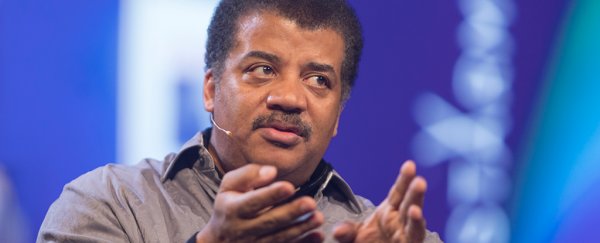Every year, on April 22, many citizens of planet Earth band together to call for action on global warming, climate change, and a clean environment.
Known as Earth Day, this campaign has been going strong for nearly 50 years, and people use it to organise marches, raise public awareness of environmental issues, and stage various activities - even if it's just to clean up garbage in their local neighbourhood.
As it turns out, astrophysicist Neil deGrasse Tyson isn't a fan of some of the messages that always surround Earth Day - specifically, he thinks it's 'odd' we are constantly talking about saving Earth.
"Planet Earth survives massive asteroid strikes - it'll survive anything we throw at it. But Life on Earth will not," he tweeted on April 22.
The perennial cry to “Save Earth" is odd. Planet Earth survives massive asteroid strikes -- it'll survive anything we throw at it. But Life on Earth will not.
— Neil deGrasse Tyson (@neiltyson) April 22, 2018
Obviously, the larger-than-life science communicator is not saying we shouldn't look after our environment.
He's come out swinging to support climate science before, and is a tireless advocate for science literacy in general.
He's also apt to stir up controversy on his Twitter feed, which is easy to do when you have 12.6 million followers and a sense of humour that doesn't always go down well on social media.
And, as an astrophysicist is wont to do, he also takes the cosmic perspective on a lot of things - even when it comes to looking after the environment.
He's right to note that our 4.5 billion-year-old space rock has withstood plenty of challenges throughout its existence, and while climate change is certainly the biggest threat currently faced by humanity, the rock itself will keep going long after we're gone.
But does NDG really have to take everything so literally? (See also: leap day.)
While his tweet is a poignant reminder that our very survival depends on how well we take care of the only planet readily at our disposal, the idea of viewing our planet as a whole has actually been a massive boon to the modern environmentalist movement.
In the 1970s - when Earth Day was still in its infancy - a now-iconic photograph of our precious blue marble became a powerful symbol for environmental activists.
It was a stunning example of a case when the cosmic perspective helped inform humanity's sentiments down here on the planet, uniting the species like never before, and spurring us on to take charge of our role as custodians of life on Earth.
That's one of the many reasons why these days we "think global, act local". Our perspective of Earth as a whole, as opposed to just our own tiny backyards with their own tiny problems, is what's helping us work to tackle the problems we've caused since the Industrial Revolution.
So, sure. If you're wanting to be super-literal about it, you can say we need to rebrand the messaging of sustainability to say "save the humans" or "save life on Earth" - but it doesn't quite have the same ring to it, and there's a good reason for that.
You can find out more about Earth Day here.
